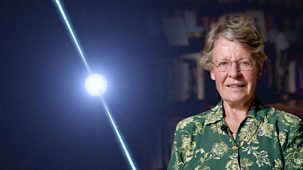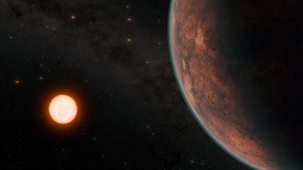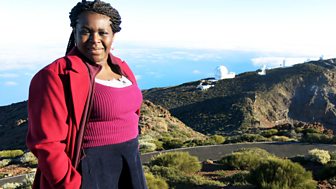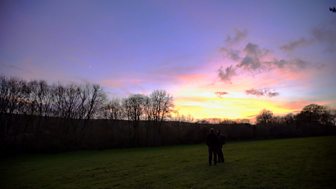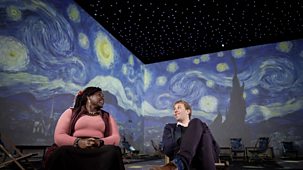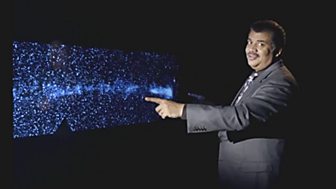
Exoplanets and Antarctica
In a month when the tally of confirmed exoplanets passed 5,000, it’s astonishing to remember that just 30 years ago, the notion of planets outside our own solar system was, well – just a notion. Since the first extrasolar planet was discovered in 1992, a staggering array of other worlds have been identified, including many in solar systems quite unlike our own. \n\nProfessor Amaury Triaud (University of Birmingham) studies binary systems - two stars locked in mutual orbit - and the planets that have been found orbiting them. Recently, Professor Triaud was the lead author on a paper describing how we might find many more planets in these solar systems with two suns – places often compared to Star Wars’ planet Tatooine.\n\nMost exoplanets have been discovered using the transit method, where a dip in a star’s luminance is recorded as a planet is observed ‘in transit’, ie passing across the star’s face. Thousands of transits have been observed using Nasa’s Keppler space telescope – the exoplanet discovery equivalent of a fishing trawler, hoovering up its quarry on an industrial scale. But while the transit method is an excellent way of discovering exoplanets, it comes with a serious drawback: the transit must be observed. In other words, the orbit of the planet, its star and the observing telescope must all be aligned in just the right place at just the right time. And in the three-dimensional vastness of space, that comes down to luck.\n\nIn binary systems, this eventuality requires even more good fortune. So, Professor Triaud and his team have been using a detection method known as the radial velocity technique. Trickier to pull off, but not reliant on happenstance. The premise of the radial velocity method is that orbiting systems are held together by gravity and will affect each other’s orbits. While a planet is held in place by its star’s gravitational field, the planet’s gravity in turn will also pull at the star, causing its path to deviate. This deviation is tiny, but critically it is measurable. The careful analysis of the degree to which a star ‘wobbles’ will tell you all about its orbiting planets. \n\nFor the first time, Professor Triaud has shown that this effect can be measured in complex binary systems using telescopes on Earth. It’s an exciting development. Many more new worlds can be discovered without the need for costly space telescopes and the luck of being aligned ‘just so’ to catch a transit. \n\nThe hunt for exoplanets is a major scientific endeavour, not only because it might provide answers to the question of life emerging in other parts of the universe, but also because it also gives us clues as to how planet formation occurs and solar systems emerge. However, it is a high precision game, and the locations for the specialist kit required are rarely the most hospitable.\n\nProfessor Triaud’s PhD student Georgina (‘George’) Dransfield recently travelled to Antarctica to work on upgrading the exoplanet hunting telescope Astep at the French Antarctic base, Concordia. George filmed the trip for us and explained to Maggie (who also has experience building telescopes in extreme locations) what the trip involved. Concordia sits 3,200m above sea level, where the atmosphere is dry and thin, making it as near to having a space telescope on Earth as possible. This, combined with the Antarctic winter giving three months of uninterrupted night sky, means it’s a no brainer as a location for a research telescope. Except, of course, its location is one of the most extreme on Earth! George and the team were there to move the telescope to a better, bigger dome, and upgrade its camera to a two-colour receiver rather than the original ‘black-and-white’ version. George was also responsible for designing and installing more advanced data handling techniques for the image-processing system.\n\nAll this would be hard enough at the best of times, but the Antarctic climate makes things a lot more challenging. ‘As soon as you step outside, the inside of your nose ices up,’ remembers George, ‘and you know, it sounds ridiculous, but I just wasn’t expecting how cold it would be!’\n\nBack in Birmingham, George is now using the uprated system in her PhD work, and is even nostalgic for Antarctica. ‘If you’d asked me at the time if I wanted to go back, I’d have probably said no,’ she confides, ‘but now, yeah, I’d definitely go back if I had the chance again!’ And if she doesn’t get that chance, there’ll be a permanent reminder of the trip – in the form of a new tattoo!\n\nAlso, in an update to last year’s programme about Jupiter, Jonny Nichols (University of Leicester) tells us how the mystery of the gas giant’s aurora has nearly been solved. ‘When I saw the data come in, I nearly fell off my chair,’ he tells Maggie. And, following a lockdown boom in telescope sales, viewer Stacey Downton from Longbridge shows us her telescopes and explains her passion for astrophotography.
Source: BBC 4
Most recent episodes of The Sky at Night
The Sky At Night
Space Mysteries: The Sky At Night Meets Curious Cases
Do aliens exist, and can we talk to them? What does a black hole sound like? Does the universe look like a doughnut? In a spectacular season finale, The Sky at Night teams up wi ...
13-11-2025
BBC 4
The Sky At Night
Brits In Space
Three, two, one, lift off! This edition launches into the extraordinary - and extraterrestrial - world of astronaut training, discovering what it truly takes to become a Europea ...
15-10-2025
BBC 4
The Sky At Night
The Expanding Universe
The team explores one of the greatest discoveries of modern astronomy - that our universe is expanding - and the new questions it raises about how the cosmos works.\n\nIn the 19 ...
10-09-2025
BBC 4
The Sky At Night
Queen Of Pulsars
Dame Jocelyn Bell Burnell is a discoverer and an explorer of the distant cosmos, and she has walked among the stars. She discovered the first pulsar in 1967 - a discovery so imp ...
14-08-2025
BBC 4
The Sky At Night
Exoplanets - Strange New Worlds
The team go on a cosmic adventure, exploring one of the newest areas of modern astronomy – the search for exoplanets, the distant bodies that orbit stars beyond our own so ...
16-07-2025
BBC 4
The Sky At Night
Greenwich: A Journey Through Space And Time
To celebrate the 350th anniversary of the Royal Observatory, the team recreate history. \n\nIn the times of the early Astronomers Royal, scientists would gather at spectacular d ...
12-06-2025
BBC 4
The Sky At Night
Secrets Of The Red Planet
Could life have once thrived on Mars? What mysterious force is moving large boulders across its dusty surface today? And will a return trip to our neighbouring planet ever be po ...
15-05-2025
BBC 4
The Sky At Night
Asteroid Strike?
The team explore one of the biggest stories in space news, the ‘city killer’ asteroid 2024 YR4. First observed on 27 December 2024, it soon became one of the biggest ...
17-04-2025
BBC 4
The Sky At Night
Ancestral Skies
This month, The Sky at Night teams up with BBC Ideas to discover the secrets of archaeology and astronomy and to reflect on our ancestral skies. \n\nThroughout history and acros ...
14-11-2024
BBC 4
The Sky At Night
Question Time Special
Get ready for The Sky at Night’s annual Question Time Special, where viewers get the opportunity to ask the questions they have always wanted answered about our universe.\ ...
08-10-2024
BBC 4
Most popular episodes of The Sky at Night
The Sky At Night
Telescope Takeover
The team travel to the island of La Palma in the Canary Islands where they take control of some of the world's largest telescopes to view the most spectacular sights in the nigh ...
12-02-2017
BBC 4
The Sky At Night
Question Time Special
A special Question Time edition of the programme, recorded at the University of Exeter as part of the British Science Association’s Science Festival.\n\nThe panel is chair ...
12-10-2023
BBC 4
The Sky At Night
Wonders Of The Night Sky
The Sky at Night celebrates one of the most profound, moving and enjoyable activities there is - the ancient art of looking up, studying and marvelling at the night sky. The pro ...
10-12-2017
BBC 4
The Sky At Night
Dark Skies
Dr Maggie Aderin-Pocock and Professor Chris Lintott visit the Van Gogh Immersive Experience to seek inspiration in one of the world’s most famous works of art, Starry Nigh ...
12-01-2022
BBC 4
The Sky At Night
Mapping The Milky Way
The Gaia space telescope is not just create the ultimate star map of the Milky Way. It is also showing us our galaxy's past and how it will change in the future.\n\nThe Sky at N ...
12-05-2021
BBC 4
The Sky At Night
How Gravity Shapes The Universe
The team travels to the Brecon Beacons AstroCamp to see how gravity shapes the universe. Chris finds out about the newest moon in the solar system.
18-05-2014
BBC 4
The Sky At Night
The Brightest Star
The team explore stargazing in the daytime, show how seasons change on other planets across the solar system and examine what makes the sun special.
13-07-2014
BBC 4





